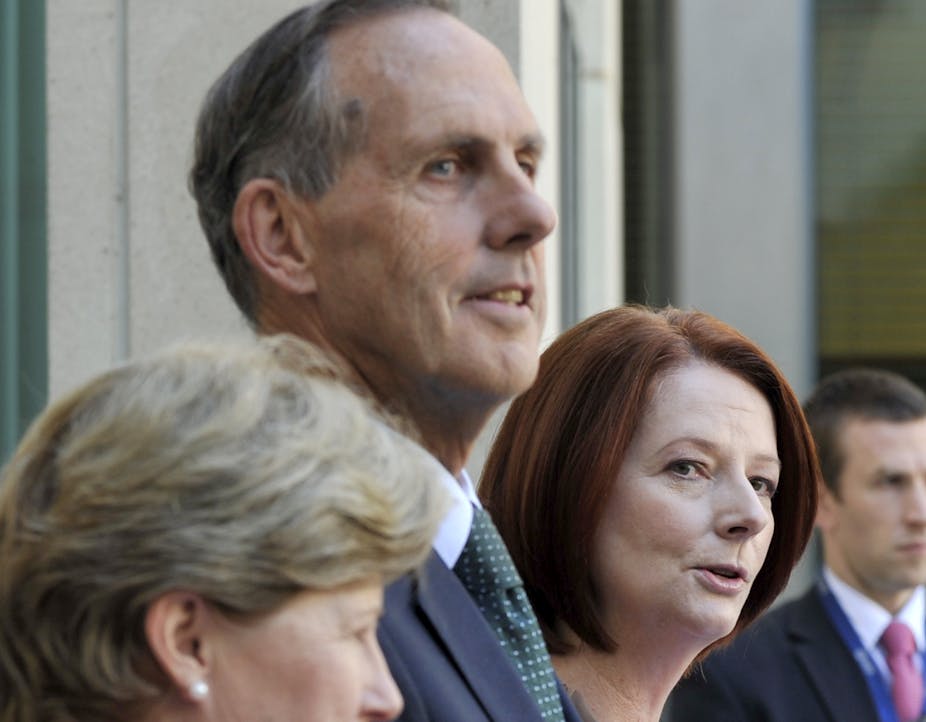Julia Gillard controversially claimed in her recent Whitlam oration that “the Greens will never embrace Labor’s delight at sharing the values of everyday Australians, in our cities, suburbs, towns and bush, who day after day do the right thing, leading purposeful and dignified lives, driven by love of family and nation.”
Previously, in an address to the Don Dunstan Foundation, Gillard criticised the Greens for being unable to “strike the balance” that would facilitate reform while protecting and providing jobs.
Both speeches, commemorating important Labor leaders, show Gillard attempting to differentiate Labor from the Greens as well as the Liberals. This is hardly surprising given that Labor is currently sandwiched between the two, with a dangerously low primary vote that results from losing support to both parties.
Gillard’s criticisms regarding jobs reflect longstanding differences that resulted in Greens senators voting down the Rudd government’s Carbon Pollution Reduction Scheme (CPRS) — which otherwise would have passed when two Liberal Senators crossed the floor.
Under the CPRS, Labor promised generous subsidies to key carbon polluting industries during the period of transition to a greener economy.
Labor argued that the subsidies would prevent capital flight to, and unfair competition from, countries with less stringent carbon reduction policies, and secure electricity supply. Greg Combet recently confirmed Labor’s ongoing support for such subsidies.
However, the Greens argue the subsidies are too generous and involve selling out to big polluters, thereby undermining attempts to cut carbon pollution or create alternative employment. Labor sees the transitional subsidies as protecting existing jobs until greener jobs are created.
Labor also wants to avoid the type of damaging, well-funded business campaigns that occurred previously against the Chifley, Whitlam and Keating Labor governments, or more recently, against the Rudd government’s mining super profits tax. Such business opposition impacts on investment, employment and on Labor’s image as competent economic managers.
Similarly, the Greens saw Rudd Labor’s CPRS targets for cutting carbon pollution (of between 5-25% depending upon international developments) as woefully inadequate given current scientific advice, while Labor argued that the Greens proposed cuts (25-40%) would devastate Australian industry.
Indeed, Gillard partly resorted to imposing an initial carbon tax, thereby risking damaging accusations of broken promises and big new taxes, because imposing a tax, unlike a cap and trade emissions scheme, did not require the deeply divided Greens and Labor to agree on specific carbon reduction targets at this stage.
It was a measure designed to win back former Labor voters who had deserted to the Greens and moderate Liberal voters concerned about climate change.
But Gillard’s comments critiquing the Greens for not sharing the values of everyday Australians seemed unclear to some.
The comments about “dignified lives” partly reflect Gillard’s view that work is crucial to providing dignity and overcoming inequality and so-called welfare dependence. The resulting tough welfare to work policies differ markedly from Greens’ views.
Furthermore, Gillard left her comments open to a variety of interpretations in order to appeal to a broad range of voters.
While she may not have been specifically targetting Brown’s homosexuality, as some critics suggested, she may well have hoped that her subtext evoking family values would appeal to those opposed to the Greens’ support for same-sex marriage.
Gillard’s subsequent clarification that the Greens did not support “mainstream” Australian values, a favourite Howard phrase, would confirm many critics’ concerns.
Indeed, Gillard argued during the Howard years that Labor should articulate its values in ways that reflect the concerns, fears and anxieties of ordinary suburban Australians in order to counter Liberal Culture Wars strategies. It is an argument that influenced Gillard’s relatively conservative position on asylum seeker and immigration issues in the last election.
Now Gillard is using attacks on the Greens to argue that Labor’s values are closer to those of ordinary voters. Her language risks straining the parties’ relationship given Bob Brown’s outrage at “obnoxious” suggestions that the Greens don’t love their families or their country.
Gillard may be hoping that her values arguments will help win back former Labor voters who have defected to the Liberals, however, it is unclear how socially conservative strategies originally designed to counter Howard’s Culture Wars will win back former Labor voters who have defected to the Greens.
For example, will Gillard now agree to a conscience vote on same-sex marriage as many in her own party want? Gillard also runs the risk of reinforcing, rather than undermining, socially conservative values that could disadvantage Labor in the longer term.
However, the fact remains that Gillard doesn’t have to manufacture substantial differences of opinion between Labor and the Greens, they are already there as the failure to pass the CPRS shows.
Labor’s minority government relationship with the Greens was always likely to be a tense one that relied on the Greens’ even stronger opposition to the Liberals. The Greens are convinced they have climate science and (on issues such as asylum seekers and same-sex marriage) human rights arguments on their side.
Meanwhile Labor faces the major problem of trying to attract both voters who have deserted to the Liberals and voters who have deserted to the Greens.
Labor is also facing long term social democratic dilemmas about how to manage a capitalist economy in which private sector investment decisions determine not only the general health of the economy but also the employment prospects of the very workers that Labor is elected to protect.

